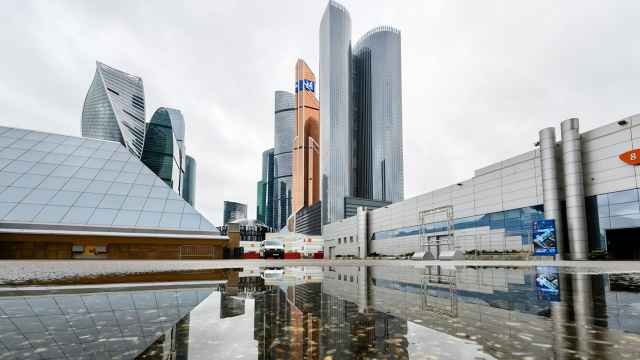Moscow jobs pay 40 percent more compared to similar positions in regional centers, but wage growth has remained stagnant in the last five years across all regions in the country, according to findings from international consulting firm Hay Group.
A five-year overview of Russia's employment market demonstrated no growth in real wages — the 6.6 percent nominal increase was offset by inflation, which has hovered above 6.5 percent since October last year.
The 9 percent nominal wage growth forecasted by the same research company of the beginning of the year did not happen due to the economic slowdown.
Russia's gross domestic product, or GDP, grew only 1.4 percent in the first six months of 2013, compared to 4.4 percent in the same period last year. However, the economy is expected to rebound by the end of the year on the back of a recovery in the European Union, Russia's main trade partner, said Timur Nigmatullin, an analyst from Investcafe.
A slower economy means reduced profits and less money that could be spent on wages and bonuses. And whatever funds become available are distributed across a few key employees, the Hay Group study said.
This leaves others with what they have, and they are bracing themselves for a fight against the growing cost of living.
An average living wage in Russia, which is the minimum income necessary to service essential bills and buy food, is 6,827 rubles ($211) per month. It is about 31 percent bigger than the official minimum wage of 5,205 rubles decreed by President Vladimir Putin this year.In comparison, the average wage in Moscow is projected to reach 60,000 rubles ($1,860) per month in 2014 and 70,000 rubles in 2016, Itar-Tass reported.
To bridge the gap between Russia's living wage and minimum wage, the federal government would have to spend 55 billion rubles ($1.7 billion), former Deputy Health and Social Development Minister Alexander Safonov said. This is highly unlikely in the current economic climate, with the state already committing 20 trillion rubles to modernize the military for the period until 2020, experts said, New Izvestia reported.
Dmitry Chervyakov, a former steelworker from the Zlatoust Steel Mill in the Chelyabinsk region, brought up the problem of low wages at a meeting with then-President Dmitry Medvedev two years ago.
"[A steelworker] at our factory receives 13,000 rubles ($403) [per month]," he said. "But the work is very hard. In summer, the temperature on the floor reaches 60 degrees centigrade."
The problem was reportedly solved, and he was elected as a member of the local United Russia branch's governing body to "defend workers' interests when dealing with higher regional authorities."
But the success was short-lived. On Friday, Chervyakov said he was forced to leave the factory a year ago and find a job as a painter, because of the "pressure from the higher [authorities]," Zlatoust74.ru reported.
He was also voted out from the party's governing body and "realized that it is difficult to change the situation on one's own."
The 40 percent pay difference between Moscow and other cities is caused by the "historically low mobility of the population," Nigmatullin said. In other words, the propensity of people to move to a different city in search for better pay is low.
However, some occupations in high demand are breaching the gap. Sales managers and engineers in some regions only receive 15 percent less than their counterparts in Moscow.
Vera Mashkova, head of human resources at Hewlett-Packard Russia and CIS, said the higher-than-inflation growth of some wages was driven by the increased demand for specialists.
Contact the author at g.moukine@imedia.ru
A Message from The Moscow Times:
Dear readers,
We are facing unprecedented challenges. Russia's Prosecutor General's Office has designated The Moscow Times as an "undesirable" organization, criminalizing our work and putting our staff at risk of prosecution. This follows our earlier unjust labeling as a "foreign agent."
These actions are direct attempts to silence independent journalism in Russia. The authorities claim our work "discredits the decisions of the Russian leadership." We see things differently: we strive to provide accurate, unbiased reporting on Russia.
We, the journalists of The Moscow Times, refuse to be silenced. But to continue our work, we need your help.
Your support, no matter how small, makes a world of difference. If you can, please support us monthly starting from just $2. It's quick to set up, and every contribution makes a significant impact.
By supporting The Moscow Times, you're defending open, independent journalism in the face of repression. Thank you for standing with us.
Remind me later.






